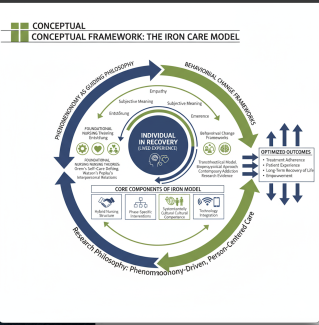The Integrated Recovery-Oriented Nursing (IRON) Care Model: A Theoretical Framework for Optimizing Addiction Treatment Outcomes

Abstract
Title: The Integrated Recovery-Oriented Nursing (IRON) Care Model: A Theoretical Framework for Optimizing Addiction Treatment Outcomes
Authors: Ahmad Muneer, MSc, RN; Hessa Abdel Qader, MSc, RN
Affiliations: Maudsley Health, Al Amal Psychiatric Hospital, Emirates Health Services, Dubai, UAE; Centre for Drug Research, University Sains Malaysia
Background:
Despite progress in addiction medicine, nursing practice continues to face systemic barriers that limit effective recovery outcomes. Challenges such as fragmented care, inconsistent use of evidence-based interventions, and insufficient cultural responsiveness contribute to diminished treatment adherence and widening health inequities.
Objective:
This study introduces the Integrated Recovery-Oriented Nursing (IRON) Care Model—an innovative, theory-driven framework designed to enhance nursing practice and patient outcomes within addiction rehabilitation settings.
Methods:
The IRON model integrates core nursing theories—Orem’s Self-Care Deficit Theory, Watson’s Theory of Human Caring, and Peplau’s Theory of Interpersonal Relations—with behavioral change frameworks, including the Transtheoretical Model and the Biopsychosocial-Spiritual approach. The model comprises four interconnected elements: (1) a hybrid care structure blending primary and team-based nursing; (2) phase-specific interventions aligned with recovery stages; (3) embedded cultural competence across all care dimensions; and (4) integration of advanced technology to support clinical decision-making and continuity of care.
Results and Implications:
The IRON model operationalizes recovery-oriented principles through standardized nursing roles, consistent evidence-based interventions, and systematic outcome monitoring—enhancing treatment adherence, patient satisfaction, and overall continuity of care.
Conclusion:
The IRON Care Model offers a comprehensive and compassionate framework with the potential to strengthen the role of psychiatric-mental health nursing in addiction rehabilitation. Future research should evaluate its implementation and long-term impact on recovery and quality of life.